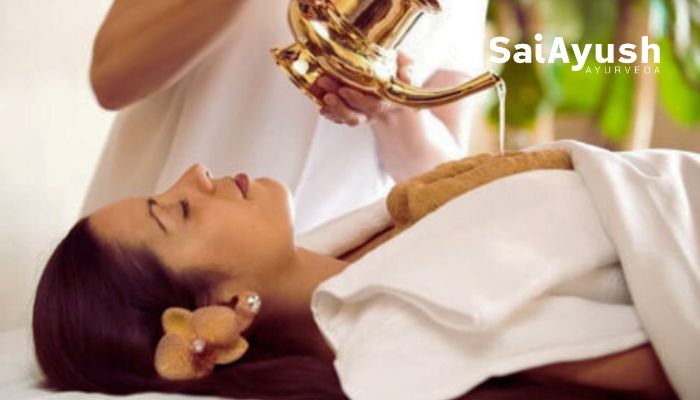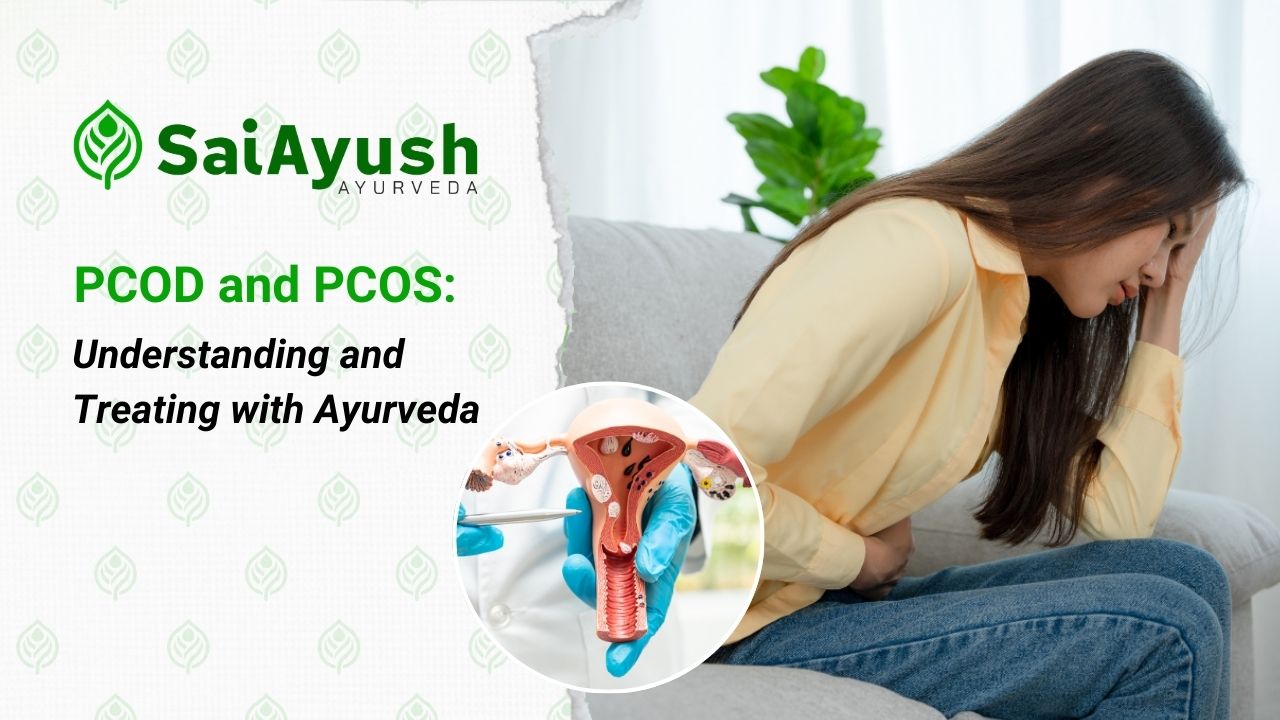PCOD and PCOS: Understanding and Treating with Ayurveda
What is PCOD and PCOS?
Understanding PCOD: Polycystic Ovarian Disease (PCOD) is a condition where the ovaries release many immature or partially mature eggs, eventually turning into cysts. This leads to enlarged ovaries and excessive production of androgens, causing irregular menstrual cycles, weight gain, and infertility.
Understanding PCOS: Polycystic Ovarian Syndrome (PCOS) is a more severe form of PCOD. It is an endocrine disorder where the ovaries produce higher-than-normal levels of androgens, leading to multiple cysts, hormonal imbalances, and metabolic issues. Women with PCOS may experience severe symptoms like acne, excessive hair growth, obesity, and increased risk of diabetes and heart disease.
Difference Between PCOD and PCOS
While both conditions involve cysts in the ovaries, PCOS is a more severe form with broader metabolic implications. PCOD is less severe and more common, often leading to fewer long-term health issues compared to PCOS.
Why Choose Ayurveda for PCOD and PCOS?
Ayurveda offers a holistic approach to treating PCOD and PCOS, focusing on balancing the body’s doshas (Vata, Pitta, Kapha) and restoring overall health. Ayurvedic treatments include Panchakarma therapies, herbal medications, dietary adjustments, and lifestyle modifications, aiming to treat the root cause rather than just the symptoms.
Statistics of PCOD and PCOS in Hyderabad, India, and Globally
- Hyderabad: Approximately 10% of women of reproductive age are affected by PCOD and PCOS.
- India: Around 20% of women suffer from these conditions, with increasing prevalence due to lifestyle changes.
- Globally: PCOS affects about 10% of women worldwide, making it one of the most common endocrine disorders.
Who is Frequently Affected by PCOD and PCOS?
PCOD and PCOS frequently affect women of reproductive age, particularly those with a family history of these conditions, obesity, insulin resistance, and a sedentary lifestyle.
Causes and Aetiology of PCOD and PCOS
- Genetic Factors: Family history of PCOD or PCOS.
- Hormonal Imbalances: Excessive production of androgens.
- Lifestyle Factors: Poor diet, lack of exercise, stress.
- Insulin Resistance: High insulin levels stimulate androgen production.
Signs and Symptoms of PCOD and PCOS
- Irregular menstrual cycles
- Excessive hair growth (hirsutism)
- Acne and oily skin
- Weight gain, particularly around the abdomen
- Thinning hair or hair loss
- Infertility
- Dark patches on the skin
Diagnosis of PCOD and PCOS
Diagnosis typically involves a combination of:
- Medical history and physical examination
- Blood tests to measure hormone levels
- Ultrasound to detect ovarian cysts
Types of PCOD and PCOS
1. Insulin-Resistant PCOS
Description: Insulin-resistant PCOS is the most common type of PCOS. It is primarily linked to obesity and metabolic issues. In this type, the body’s cells become resistant to the effects of insulin, a hormone that regulates blood sugar levels. As a result, the pancreas produces more insulin to compensate. High insulin levels stimulate the ovaries to produce more androgens (male hormones), which disrupts the normal functioning of the ovaries.
Symptoms:
- Weight gain, particularly around the abdomen
- Difficulty losing weight
- Cravings for sugar and carbohydrates
- Fatigue
- Skin tags and dark patches of skin (acanthosis nigricans)
- Irregular menstrual cycles
- Excessive hair growth (hirsutism) and acne
Management:
- Low-glycemic diet to manage blood sugar levels
- Regular physical activity to improve insulin sensitivity
- Medications like metformin to regulate insulin levels
- Ayurvedic herbs like fenugreek and bitter melon to support insulin regulation
2. Post-Pill PCOS
Description: Post-pill PCOS occurs in women who experience symptoms of PCOS after stopping birth control pills. Birth control pills suppress ovulation and hormone production, and when discontinued, there can be a temporary surge in androgen levels, leading to PCOS symptoms. This type of PCOS is usually temporary, and symptoms may improve over time as the body adjusts to its natural hormonal rhythm.
Symptoms:
- Irregular or absent menstrual cycles
- Acne and oily skin
- Increased hair growth on the face and body
- Weight gain
Management:
- Monitoring menstrual cycles for a few months post-pill to observe changes
- Hormone-balancing herbs like Vitex (Chaste Tree Berry)
- Supporting liver detoxification to aid hormone metabolism
- Stress management techniques to balance cortisol levels
3. Inflammatory PCOS
Inflammatory PCOS is associated with chronic inflammation in the body. This type is characterized by elevated levels of inflammatory markers, which can stimulate androgen production and disrupt ovarian function. Chronic inflammation may result from various factors, including diet, lifestyle, and underlying health conditions.
Symptoms:
- Chronic fatigue
- Joint pain and muscle aches
- Skin conditions like eczema or psoriasis
- Digestive issues such as bloating and irritable bowel syndrome (IBS)
- High levels of C-reactive protein (CRP) or other inflammatory markers
Management:
- Anti-inflammatory diet rich in omega-3 fatty acids, antioxidants, and fiber
- Avoiding inflammatory foods like refined sugars, processed foods, and trans fats
- Ayurvedic herbs such as turmeric and ginger to reduce inflammation
- Regular exercise and adequate sleep to support immune function
4. Hidden PCOS
Description: Hidden PCOS, also known as “adrenal PCOS,” is often linked to other underlying health issues such as thyroid dysfunction or nutrient deficiencies. This type of PCOS is not primarily driven by insulin resistance but by adrenal gland imbalances, which can lead to elevated levels of DHEA-S, an androgen produced by the adrenal glands.
Symptoms:
- Irregular menstrual cycles
- Hair thinning or loss
- Unexplained weight gain or difficulty losing weight
- High levels of DHEA-S in blood tests
- Symptoms of thyroid dysfunction (e.g., fatigue, cold intolerance, hair loss)
Management:
- Comprehensive blood tests to identify underlying thyroid issues or nutrient deficiencies
- Thyroid-supporting herbs and supplements, such as Ashwagandha and selenium
- Nutrient-rich diet to address deficiencies
- Stress management and adrenal support with adaptogenic herbs like Rhodiola and Holy Basil
Conclusion
Understanding the different types of PCOD and PCOS is crucial for effective management and treatment. Each type has unique causes and symptoms, requiring tailored approaches to treatment. Ayurveda offers a holistic solution that includes dietary adjustments, herbal remedies, and lifestyle changes to address the root causes and restore hormonal balance. At Sai Ayush Ayurveda Hospitals, we provide personalized treatment plans to help women manage their PCOD and PCOS symptoms naturally and effectively.
Prevention of PCOD and PCOS
- Maintain a healthy weight through balanced diet and exercise
- Manage stress through relaxation techniques and yoga
- Regular health check-ups to monitor hormone levels

PCOD and PCOS Treating with Ayurveda
Home Remedies and Yoga for PCOD and PCOS
Home Remedies:
- Consume a diet rich in whole grains, fruits, and vegetables
- Include anti-inflammatory foods like turmeric and ginger
- Drink spearmint tea to reduce androgen levels
Yoga:
Surya Namaskar: Improves overall health and balances hormones
Baddha Konasana: Stimulates reproductive organs
Dhanurasana: Regulates menstrual cycles
Pranayama: Reduces stress and improves hormonal balance
Ayurvedic Panchakarma Treatment Options for PCOD and PCOS
Ayurveda provides comprehensive treatment options such as:
- Vamana: Therapeutic vomiting to eliminate toxins
- Virechana: Purgation therapy to cleanse the bowels
- Basti: Medicated enema to balance Vata dosha
- Nasya: Nasal administration of herbal oils
- Raktamokshana: Bloodletting to purify the blood
Detailed Explanation of Ayurvedic Treatment
Ayurvedic treatment for PCOD and PCOS focuses on detoxification, hormonal balance, and lifestyle changes. Panchakarma therapies help in removing toxins, while herbal formulations like Ashwagandha, Shatavari, and Guduchi support hormonal balance. Dietary recommendations include consuming foods that pacify Vata and Kapha doshas and avoiding processed and sugary foods.
FAQs
Q: What is the main difference between PCOD and PCOS?
PCOD is a condition with fewer long-term health issues, characterized by immature egg release and cyst formation. PCOS is more severe, involving hormonal imbalances, multiple cysts, and broader metabolic complications.
Q: How does Ayurveda help in treating PCOD and PCOS?
Ayurveda treats PCOD and PCOS by addressing the root cause through detoxification, herbal medications, dietary changes, and lifestyle modifications. Panchakarma therapies and specific herbs help restore hormonal balance and overall health.
Q: What are the common symptoms of PCOD and PCOS?
Common symptoms include irregular menstrual cycles, excessive hair growth, acne, weight gain, thinning hair, and infertility. PCOS may also involve severe metabolic issues like insulin resistance.
Q: Can yoga help in managing PCOD and PCOS?
Yes, yoga helps manage PCOD and PCOS by reducing stress, balancing hormones, and improving overall reproductive health. Specific asanas like Surya Namaskar and Baddha Konasana are particularly beneficial.
Q: What dietary changes are recommended for PCOD and PCOS?
A balanced diet rich in whole grains, fruits, vegetables, and anti-inflammatory foods like turmeric and ginger is recommended. Avoid processed foods and sugars to help manage symptoms effectively.
Discover the healing power of Ayurveda with our latest article at Sai Ayush Ayurveda Hospitals! Dive into the age-old wisdom that can rejuvenate your body and mind. Click here to read more:



0 Comments